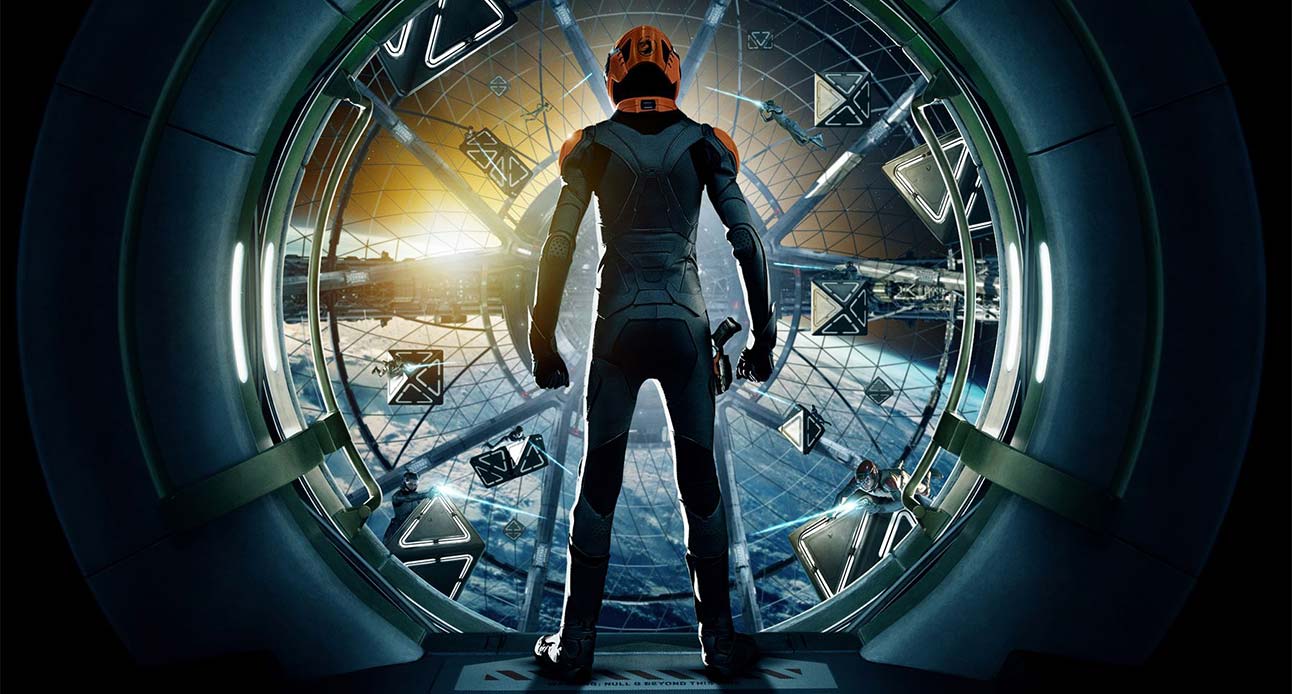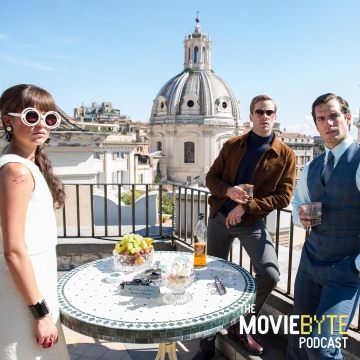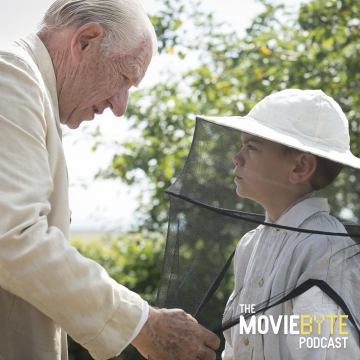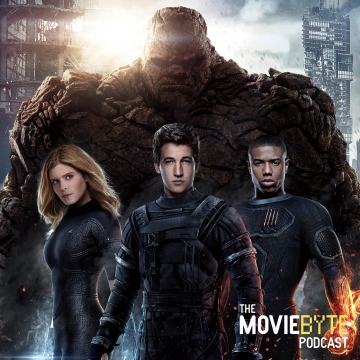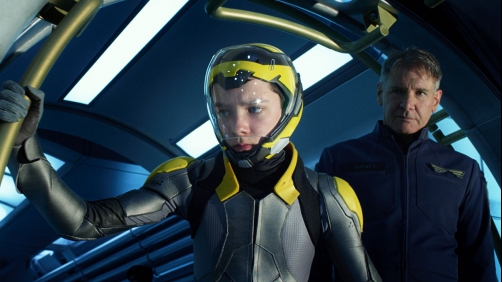
I was looking forward to this film quite a lot. So the question before us now is this: did it live up to the hype and/or my expectations? The answer to that question is somewhat complicated.
I was one of the very few in the world who had not read the book. Not only had I not read the book, I hadn’t even heard of the book — nor for that matter had I heard of Orson Scott Card, the book’s author. Given that, I had to make the decision as to whether I wanted to the film’s experience preserved by my having not read the book or known anything about the story walking into the theater or whether I wanted to read the book and potentially risk spoiling the film experience.
I love books even though I don’t get the chance to read as much as I used to. So I opted for the audio book format so I could listen in my moments of free time and on my commute to and from my job. I found the book to be just a little weird but I also found myself falling in love with the book and the character of Ender. Despite any controversy surrounding Orson Scott Card these days and whether he could pull it off again, he wrote a fantastic book contained within a fantastic fictional world — one that was certainly far from perfect. They sent children to war for crying out loud. But this provides the catalyst for the story and for the wrestling with the moral dilemmas for which Ender’s Game is now known.
This love of the book is, of course, exactly what I feared might happen. There’s virtually no chance that any film adaptation of a book I love can ever completely satisfy me. So I approached the film with a little bit of trepidation — which was not, in fact, unwarranted.
The Essentials
I am pleased to say that the essentials of the story are indeed present in this film adaption. Ender is the third child born to his parents in a society that has very strict rules and laws limiting children to two per family. But Ender’s parents have special permission to have a third child due to the fact that the genetics are very good and the two previous children are almost just the type of children the International Fleet is looking for.
Ender proves himself capable to those monitoring his progress and they take him off to battle school which is located in orbit of earth. There he learns military discipline and how to think and fight in a zero gravity environment. Along the way he is forced to deal with alienation, command, control, tactics, and everything else thrown at him by both the students and the teachers.
From there, he and a very select few are taken to command school which is quite a ways from earth and much closer to the Formics (Buggers) home planet. He must train rigorously in simulation after simulation of battle drills and command abilities. He must become the commander the International Fleet needs in order to win the war with the Formics.
Those familiar with the story will no doubt realize a) what a very high overview I have just given you and b) the major big part I left out. But while I will likely spoil the film later in this review, I have no intention of dropping spoilers that big this early. Let’s just say that the ending has some twists and turns (duh).
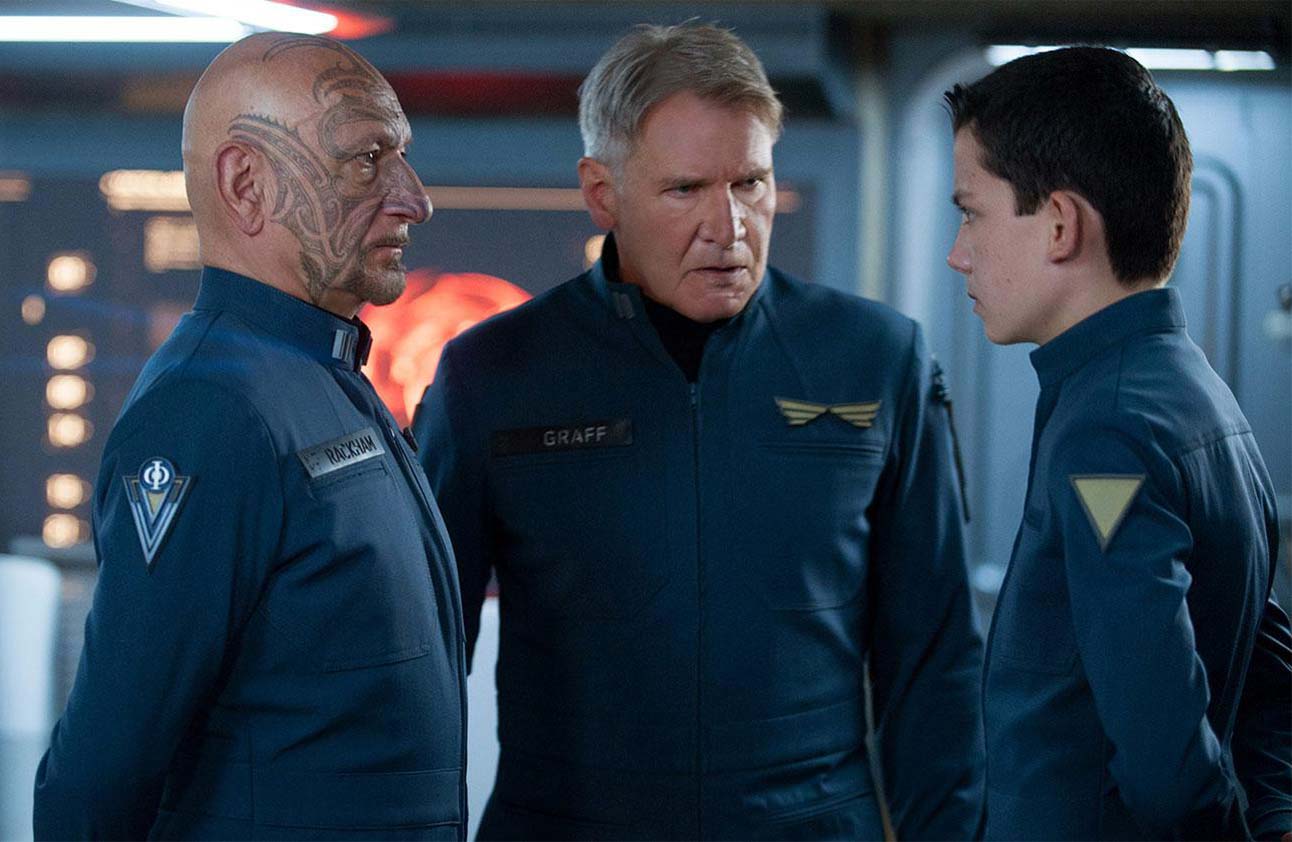
A (mostly) Preserved Experience
The film definitely starts off on the right foot, right in the same place the book itself does, with Ender finding himself on what looks like the losing side against a school bully gang. But this is how we begin to discover how Ender thinks and operates: he deals with the situation in such a way as to make sure that those bullies cannot hurt him again. This is essential to the character of Ender and so it is quite fitting that this encounter is essentially unchanged from the version we have in the book. The only thing that might give one pause is that Ender is obviously older in the film than he was when the incident took place in the book. Though Asa Butterfield does not look like a 16 year old, he doesn’t look like a 5 year old either. But frankly I think this is a change for the better. Much as I came to love the book, I never bought into the idea of such young ages for the children being drafted into the International Fleet’s battle school.
One of the things I thought would be nearly impossible to put in the film in any way that made sense was the computer mind game that Ender constantly played while at battle school. It involved some strange imagery — even disturbing imagery — and I thought for sure that such would not make the cut. But they actually did a pretty good job with it. Though the amount of time spent with the game is quite truncated, the most important elements and Ender’s discoveries in the game are there and work well to tie in with the necessary ending elements.
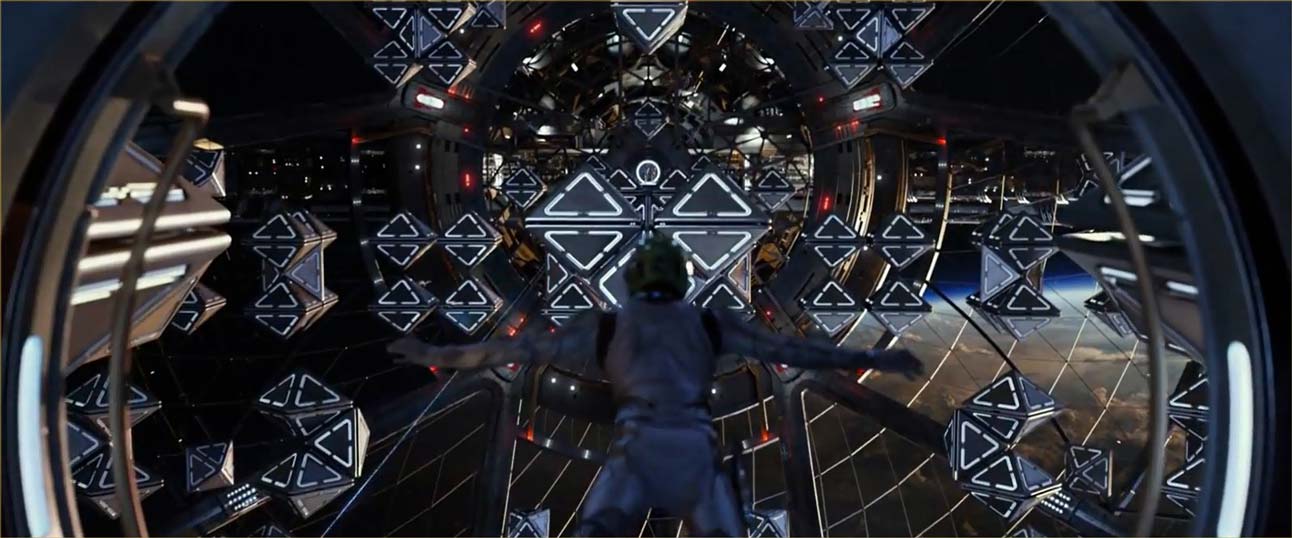
I was also impressed with the battle room which is more or less the way I had envisioned it (though the film makes it seem like there is only the one room when there were several on the station as far as I could tell from the book). The zero gravity environment was done very well and I was quite happy with it.
The command school battle simulator was fantastic and though the change was made to put Ender in the same room with his subordinates, I again think this change is for the better. Films are visual by nature (who would have thought, eh?) and having them together works much better for the film.
A (mostly) Rushed Experience
Unfortunately the film did have its flaws. The major flaw of this film was that its pacing was way off. It often spent time on things that were not as important and rushed things that were much more important. I had been hearing this about the film by the time I got myself into the theater but I thought, come on, all film adaptations of beloved books feel rushed. After all, books take many days to read (usually), and films are two hours. But I can now agree with this major criticism of the film.
I think one of the things that could have helped make the film not feel rushed would have been to cut elements that were nods to the book, but not fully fleshed out. I know they felt they needed to establish what kind of character Peter Wiggin was so that they could have the scene in the mind game with Ender seeing Peter in the picture, but frankly it didn’t work. Peter was onscreen for all of 60 seconds. I would have been mightily confused had I not read the book. His character should have been cut from the film.
Bean is also a character that feels only like a nod. He’s introduced on Ender’s flight up to the school, which is much sooner than he was introduced in the book. And then he’s only given a couple of lines and never has much to do in the film — which is unfortunate. But again, I think it would have been better just to cut the character.
Then there’s the fact that the entire experience at command school is changed to have taken place within the space of thirty days for Ender instead of the several years that it was in the book. This really makes no sense at all and it’s unfortunate. Time could have been shown to pass in the film — at least months or a year or so would have helped — to make the film seem less rushed. Unfortunately I think that director Gavin Hood had this misguided idea that he could create tension and urgency by compressing the timeline. This didn’t work for me at all and really just reduced the plausibility for me.
And while I’m glad that Valentine is in the film, she did not get enough screen time and consequently her part in the life and influence of Ender feels strange. And since we haven’t spent as much time as we needed getting to know Ender’s style and fighting tactics and techniques (we really only saw him lead one battle in battle school), his conversation with Valentine on the boat when she’s trying to convince him to get back to work and become a commander so he can beat the Formics, doesn’t work. He’s talking about how when he really comes to understand the enemy, in that moment he also loves them. But it falls flat since that hasn’t been established.
The Enemy’s Gate is Down
Sorry, I’m not done with my irritations yet. Proving still more that the pacing is weird and rushed, the idea of the enemy’s gate being down is thrown out haphazardly in the film. And it’s not even thrown out by Ender, whose idea it was in the book because of his military brilliance, but by Bean. And it’s thrown out there as a throw-away line and never mentioned again. Why even say anything about it? I don’t get it. It’s a pretty big concept in the book so I would actually rather have seen it fleshed out. But since it’s such a throw-away line in the film and not even Ender’s idea, why trot it out at all? I don’t get it.
The Climax
I suppose I don’t need to warn you about spoilers. You guys are smart. And yet, I’ll just mention it. I’m about to spoil the film and the book in a major way!
SPOILERS AHEAD
I was quite satisfied with the resolution of the war with the Formics and Ender’s realization that he was not playing a game and had just committed genocide unknowingly. I don’t know how many young actors could hold their own in an argument with Harrison Ford but Asa Butterfield did a fantastic job. His emotionally raw performance here was spot on and certainly evoked the same feelings and presence I got when reading the book. And for this, I commend the cast and Gavin Hood.
What’s a little more frustrating though is the final climax of the film. While it essentially does what the book does, it does not do so in a way that makes sense. In the book, many years pass, Ender is a leader of his people on a distant planet, and he discovers a bugger cave with a unhatched queen of the Formics. He discovers that the war was mostly due to a misunderstanding on the Buggers part. He vows to preserve the unhatched queen and re-seed the population of the buggers and to be a speaker for the dead.
In the film, years do not pass. In fact it appears that there’s a living bugger queen right on the same planet that command school is located on, and they never detected her. She telepathically and silently communicates with Ender — and wipes away his tears with her foot! — and he then vows to be the speaker for the dead and re-seed the population of the Formics. It doesn’t make nearly as much sense and the whole thing feels rushed. It was a bit of a disappointment.
Great Cast Though
Asa Butterfield knocked this one out of the park. Having now seen his performance I cannot imagine anyone else playing Ender Wiggin. I felt that he brought a lot of nuance and heart to the character. Though many have complained about the softening of the character of Ender and others in the film, I thought it worked quite well. We got Ender’s feelings and hesitancy from his thoughts in the books, though he never showed it outwardly. But that would be very hard to communicate in the film so I thought the balance that he, the script, and director Gavin Hood struck here was rather well done.
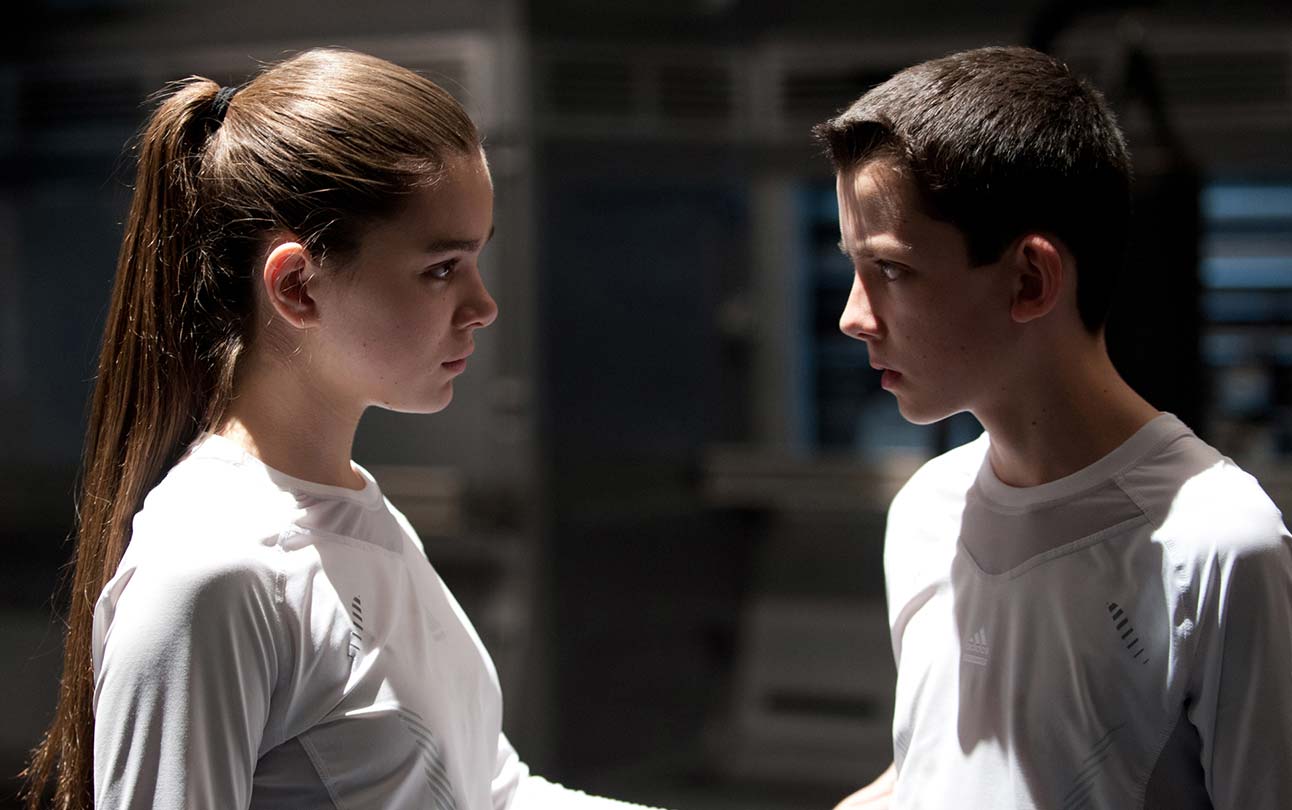
Hailee Steinfeld as Petra was also quite good. This is the first time I myself have seen her in anything, though I hear her performance in True Grit was nothing short of amazing. Though many can (and even I do a bit) quibble with the parts of the story that were tampered with involving Petra and the subbing and switching of armies, there can be no doubt that her performance was well done.
There is of course, Harrison Ford. Many love to criticize Ford’s acting of late, but the last thing I saw him in was 42, and I thought he did quite an excellent job there. Still, his performance here is, if anything, even better. He manages to capture pretty much what I envisioned Colonel Graff to be. He’s a bit gruff and somewhat ruthless, though deep down he does care for Ender even if he’s a bit misguided and focused on winning the war.
Casting Viola Davis as Major Anderson was somewhat unexpected and quite delightful. And in fact I’ll say that the diversity of the cast was quite well done.
Is the Game Worth Playing?
Despite my numerous problems with the film and some rather unfortunate pacing issues, I did enjoy the film rather a lot. It did stay true enough to the spirit of the book in many ways, and for that we can be thankful. Despite the irritations and the frustrations I think it’s worth seeing and I don’t know if we will ever see a better adaptation.
